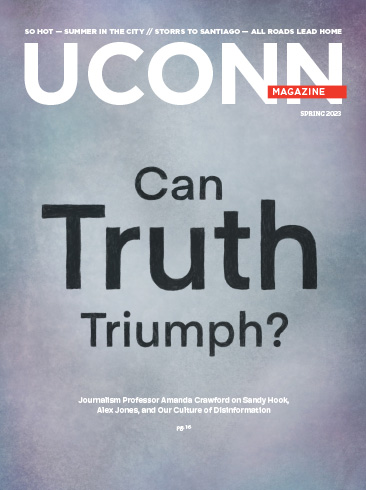
The latest issue of UConn Magazine leads with a personal essay by Assistant Professor Amanda Crawford, who has spent the last few years digging into a many-chambered labyrinth of modern society: the 2012 Sandy Hook tragedy, gun violence and attitudes about gun control, online misinformation and conspiracy theories.
In the UConn Magazine piece, “Can Truth Triumph: Journalism Professor Amanda Crawford on Sandy Hook, Alex Jones, and Our Culture of Disinformation,” Crawford describes how she got interested in mass shootings and conspiracy theories. Over the past few years, she has published pieces on the Sandy Hook aftermath and conspiracies and those who supported them in many outlets, including the Boston Globe, CNN, the Chronicle of Higher Education, and The Conversation. She is writing a book about Sandy Hook and its aftermath.
After UConn Magazine invited Crawford to contribute, she decided to write a more personal reflection. “I told them I had an essay I had been working on that described why I started focusing on conspiracy theories and mass shootings in my research,” she says. “I started writing it because I was really trying to explain and understand my own feelings around the marketplace of ideas.”
The piece begins with a dream she had while suffering influenza during a boating trip off the coast of Mexico. In the dream, the wind seemed to signify how wanton lies had taken over the public dialogue. “All the winds of misinformation,” she writes. “A tempest of fake news and propaganda. Winds of hate. Winds of willful and wanton ignorance.”
That dream was one way her mind was working out her thoughts on the problem. Crawford says, “I remain very torn over the solution to online misinformation. I’m not, as some have misread, advocating for censorship here but rather trying to parse out my own feelings about free speech in the digital era.”
One thread of Crawford’s research has been following how Sandy Hook father Lenny Pozner was trying to advocate for his son’s memory while receiving multiple threats to his safety. Crawford says that the conflict between free speech and the harm done by lies spread on the internet lie “really at the heart of the existential issues the U.S. faces.”
She asks, “Can we protect both truth and free expression?”